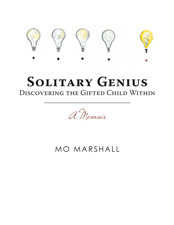Why the Title “Solitary Genius” ?
Why the title Solitary Genius?
I do all of my writing from my intuition. It is as if something takes over. I start typing away, not really sure who is doing the writing. I can tell my writing comes from my intuition because sometimes certain ideas “drop in.” Writing Solitary Genius was a major learning experience for me. I didn’t even think or know I could write well. I remember as a teenager, for one of the first times in my life, my father was reading an essay I had written for my college application to Loyola College in Maryland. I clearly recall his feedback saying, “This is good. You’re a very simple writer, but clear.” To me, that was an insult. The word “simple” as a teenager just isn’t something you want to hear. I smiled at my dad, saying thank you as my heart sank. So, to think that I could write a book or even an interesting essay was not something I considered.
After I got out of college, I was teaching the children I write about in Solitary Genius and I found that I had so much inside of me which they inspired that the only way I could find a way to express it was to start writing their inspirational stories in my trusty journal.
That is where Solitary Genius began: within my personal journal pages. I have never taken a writing course and no one ever said in my entire career of private schooling that I had any sort of writing skill, so why would I think I was a good writer by any means? It seemed like a fluke for me to discover that I could write or that anything within my personal journal pages was of value other than for my own personal reflection.
In my 20s, I lived on the Upper West Side in Manhattan. The first assumption when someone hears you live in Manhattan in your twenties is that I was out living it up, partying as much as possible. In reality, it was a rare occasion that I was partying. I’m not a huge drinker and I never have been. Instead, in my 20s you would find me more often than not in the Barnes and Noble on 82nd and Broadway upstairs in the Self Help and New Age section. I was trying to figure out my purpose in life. No wonder I never got married in my 20s. How many 20 year old guys do you find in Manhattan at the Barnes and Noble in the Self Help and New Age Section?
Upon hearing this, one of the first questions asked is, what did you love doing as a child? The second is what do you lose all sense of time doing? It’s not the easiest question to answer because as a child I feel like there are so many different experiences you love. Writing did not stick out as one of the top three things that I loved to do as a child. I loved my tap and ballet classes as a child, I loved my ceramic classes, and I loved Art class. I was obsessed with dress up, walking in my Mom’s high heels, playing dolls and having pen pals. Yes, this really dates me to say I had pen pals, but I did and it was one the best things I thought there was. Ironically, one of my friends that was a pen pal to me as a child is a writer today as well. So, like does attract like, especially as little children. When I was in college I took an oil painting class and I have never found myself so lost in time. If I pull out my oil paints (which is maybe once a year these days and this is a goal of mine to change this fact), I have no sense of time. Everything around me does not exist. It is like a trance. So, all of these things told me, I’m a creative, but what did that mean my purpose is? After speaking with a particular life coach in my late 20’s while I was trying to figure it all out, it all came together, although I almost didn’t believe it. Those stories I had written down in my journal about teaching my students fresh out of college really was a book. So, I dug in and went through the long process of learning how to write a book. I just kept writing and writing. One morning I woke up and it was as if someone directly whispered in my ear, “The title of your book is Solitary Genius”. It was as if a light switch went on. I was trying to capture the children I taught in the title of my book, and for weeks, I couldn’t figure it out.
To me, Solitary Genius was the perfect solution. All of my students that I taught were solitary and they all had their own genius inside of them, no matter what their struggles were. It was a matter of patiently discovering their genius that made them such special souls. With a title on top of my stack of typed pages, I handed my manuscript to my very well esteemed editor who I was more than lucky to be connected with. I was nervous. What if she told me it was garbage and didn’t make sense? I waited for a few days and then I received a voicemail from her asking me to call her back.
That was when the words I never imagined I would hear came out of her mouth. “Maureen, have you ever taken a writing course?” No, I haven’t. “No writing class, ever?” No, never (Oh no, here it comes. Go take a class and get back to me). “Well, I just can’t believe you have never taken a writing course. You are a very talented writer.” I wanted to cry and hug her through the phone. Could this be true? The only way to find out was to get Solitary Genius published, which I did.
Solitary Genius has been an interesting ride for me. My mother made it clear she did not like the book when it was first published because she felt it exposed our family and that this was not fair to my siblings. No one wants to have your mother yelling at you for something you have put so much heart and soul into. I had to believe that the larger message would prevail and perhaps, my mom would change her opinion. Like everything, time continues and time heals things. I don’t think Solitary Genius will ever be one of my Mom’s liked books, but she seems to be just okay with it at this point in life. Most importantly, I hope that the messages within its pages are really heard.
I know there are a number of messages and I also know that whatever the reader hears is the one they need at that particular time. But, if I could choose one, this is what it would be:
I hope the reader hears the unspoken. That is, in my heart I believe that these children who face so many communication challenges are here to teach us about energy and the power of the unspoken. They are here to provide us with an awareness of the power beyond words and conventional communication – to push us to a higher level of understanding of what it means to connect and communicate. If we ignore it, they will continue to speak louder through the unspoken. So, let’s listen on their terms. Let’s look at our energy, the sensitivities and overstimulation of our world and work as hard as we can to simplify. I know there are many messages within the pages of this book, but this is the one that I hold most dearly for my Solitary Geniuses.
-Mo
Interesting in reading Solitary Genius? Click here.


